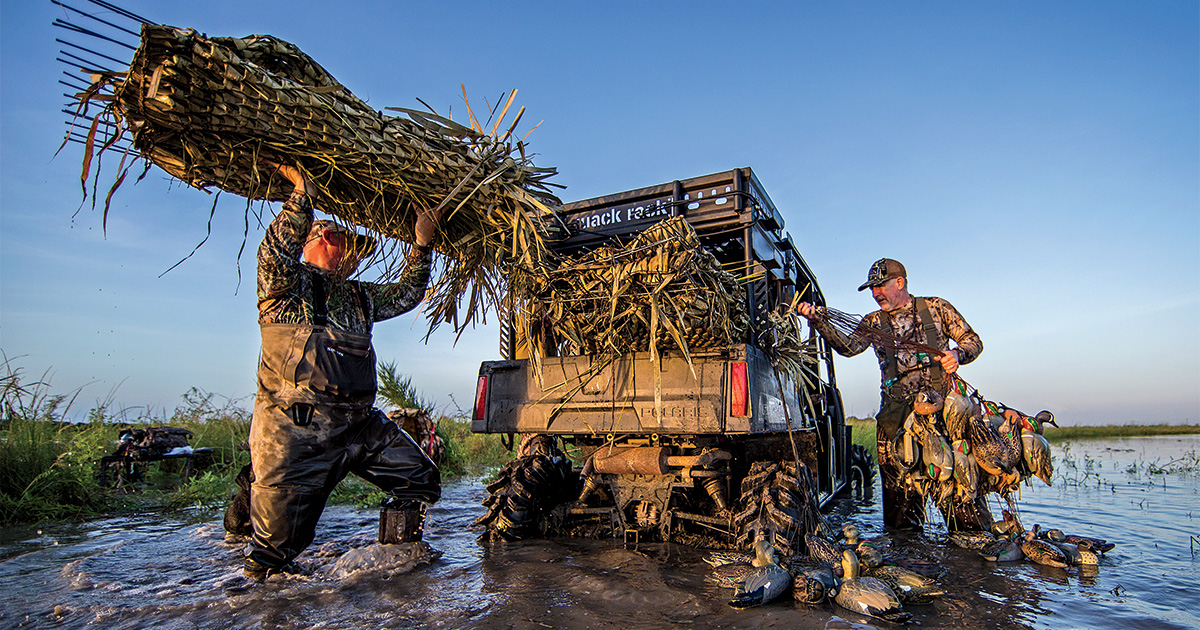Waterfowler's World: How to Be a Good Guest
When you’re fortunate enough to be asked on a hunt, these common courtesies will help get you invited back
When you’re fortunate enough to be asked on a hunt, these common courtesies will help get you invited back

By Bill Buckley

Always offer to help with any work before and after the hunt.
I admit that I've not always been an exemplary guest, but wisdom accrues with age and experience, and I've come to discover that being a good guest is somewhat of an art form. If you know your host well, there are certain liberties you can take versus when you're with a mere acquaintance or stranger. One of the best guests I know is my buddy Clay Connor, whose mission upon being invited anywhere, by anyone, is showing gratitude and respect.
Clay's thoughts on this subject will serve you well anytime you're invited on a hunt.
"Being invited to hunt someone's property or camp isn't about you," says Connor. "It's about your hosts sharing the valuable resource into which they've invested countless hours and oftentimes significant funds."
Show your appreciation by not inserting yourself into every conversation, and follow your host's requests to the letter. If you arrive with an upbeat attitude and no expectations, you'll never be disappointed. And you'll make your host's job a lot easier, as it's the rare person who doesn't fret over his guests having a good time.
It's also the rare host who doesn't like to talk about his place. Most duck-hunting properties, especially really good ones, are the result of many years of hard work, vision, and considerable financial investment. Ask about the place's history and improvements your host made—anything that catches your curiosity. Expressing your sincere interest is a good way to break the ice with hosts and further your appreciation of being there.
Connor never shows up to a hunt empty-handed. Any gesture, from food to drinks to something else he thinks a fellow waterfowler might enjoy, instantly conveys his appreciation for being invited. If meals are being prepared at camp, offer to help cook, serve, or clean up. The same goes for preparing for the hunt, setting out and picking up decoys, cleaning birds, and tidying up camp after the hunt. Show your willingness to help. Just don't be pushy about it. Some hosts have their own systems in place and don't want assistance. They will, however, always appreciate it when you ask where they want you to store your gear, when you should be ready to depart for a hunt, and so on.
Leave everything you used—equipment, room, whatever—in better shape than you found it. If the hunt involves lots of boat time or driving around, offer to pay for gas. Even if your host declines, it shows that you don't take it for granted.
Unless you've hunted there for a long time and have already established a routine, leave your dog at home and your calls in your blind bag. And don't place your host in an awkward situation by even asking about them. Also, never attempt to control his or anyone else's dog or how the hunt is being conducted. While you've both waited many months for duck season to arrive, he's the one who has invested all the resources necessary to create this hunting opportunity.
Nobody likes a game hog. If your natural inclination is to shoot at every flock that drops into range, curb your enthusiasm, especially with singles and small flocks. Wait until shots are called, stay within your designated shooting lane, and if you've taken plenty of shots, put up your gun, especially in the event that you've shot your fair share. It should go without saying to be sure to keep track of your birds and adhere to bag limits.
Thanks and a handshake upon leaving should be followed up with an e-mail or note of thanks, perhaps with a nice photo you took during the hunt. Just as important, Connor emphatically says, "Take your birds! It's not your host's job to find a home for the ducks you shot." Like good first impressions, even small gestures of gratitude often result in future invitations.
Ducks Unlimited uses cookies to enhance your browsing experience, optimize site functionality, analyze traffic, and deliver personalized advertising through third parties. By continuing to use this site, you agree to our use of cookies. View Privacy Policy